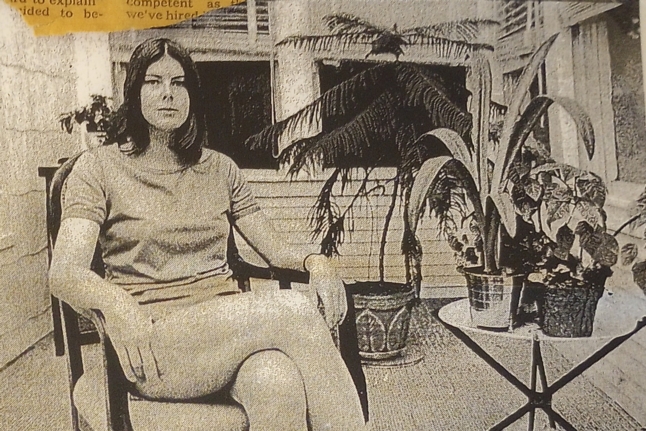"Here comes Cop Robin"

July 10, 1973 Minnesota Daily
by Patrick Darcy
“Here comes Cop Robin”
Rookie cop Robin Lee said she wanted to get into some kind of social welfare work for a long time, “but police work was very definitely the last thing on my mind.” Yet she has enjoyed her first six months on the University police force and thinks she may have found the career she has been searching for.
Lee attended the University off and on for about six years, working toward some kind of social welfare degree. She lived near campus and worked at various University related jobs.
Besides selling tickets to University athletic contests, Lee has served beer at Stub and Herb’s and sold bicycles in the University area. But she was 24 years old and thought it was time to begin a serious career.
“I knew a couple of the guys on the force from working at Stub and Herb’s, and they mentioned that the University police were going to start hiring women,” she recalled. “I thought if I could handle working in the bar that maybe I should give police work a try.”
She took the interview more or less as a lark.
“Actually, I wanted to start working somewhere and I needed professional interviewing experience. I was terrified during the interview. I figured I’d never make it through. When I got out of there I couldn’t remember who I had talked to or what I said. When we started talking, the interviewer said it would last about 20 minutes, but he talked to me for only five minutes. I thought I had blown it completely.”
Lee mentioned to her friends on the force that she had applied for the job and they told her they never thought she would take them seriously. But they put in a good word for her and she was hired.
Starting Jan 16, Lee became one of the first three women hired by the University police. The 63-person force patrols the East and West Bank campuses, the St Paul campus, the Health Sciences complex and the residential areas immediately surrounding the University. University police radios are hooked up with the Minneapolis system so the force also assists in arrests or accidents occurring near the University.
Lee has had to get used to a few things since she became a cop, such as having men whistle at her when she walks her beat and wearing a loaded gun.
Some of Lee’s friends have drifted away since she joined the force, and now when she goes into her favorite bar friends say, “Here comes cop Robin.” But she shrugs it off.
“When I walk around campus, I get a lot of stares and whispers- people aren’t sure if I’m a male cop with a ponytail or if I’m really a woman. The uniform doesn’t do much for me. And then a lot of people ask me if the gun is loaded. ‘No’ I tell them, ‘I only carry it for looks,’ but I’m only kidding.”
When Lee was younger, she lived on a farm for several years and her father taught her how to use a .22 rifle, but at first, she felt nervous about having a weapon strapped to her side for eight hours a day.
“This little pistol is a pretty awesome instrument. I was a little afraid of it until I went out to the police range and started shooting it. But now it’s become a part of the uniform. It’s an enemy before you know it and after that it becomes a real friend. I might have to use it to save someone’s life—or my own life. When you go in on an alarm or holdup you have to have it unstrapped and ready to shoot. And it wouldn’t do any good if it wasn’t loaded.”
Lee doesn’t think she would have ever started with the Minneapolis police force- especially since they have had a bad reputation on campus. Yet she says her view of police has changed immensely since she started wearing a badge.
“I don’t see how anyone can say that you don’t need police. there are always going to be some people wo are going to infringe on the rights of others. It would be lovely to just live the way youwant and not have others jumping on you. But it isn’t reality.”
Lee is aware the University has hired women partly because of outside pressure and realizes she is being used as a guinea pig but would rather be judged on her own merits.
“I don’t feel that my performance should have any bearing at all on whether women are hired to be cops in the future, but I realize that I am part of an experiment. You’re being looked at because you’re doing something that women usually don’t do. It’s like when I walk around the hospital when I’m working. I can’t help but feel a little bit funny about male nurses.“
“But to me, I was just applying for a job, and I would like to be judged like any other new person.”
Lee thinks every rookie has to learn, but she doesn’t think because she’s a woman she has any special handicaps. She is not a small person and in fact is taller than some of the men on the force. She is not prone to emotional displays in public, so she does not think she would break down any more than a man would under stress
“In fact, we can help more assault cases because a woman is comfortable talking to another woman. After a woman has been raped the last thing she wants to see is another man. And we should be better in domestic cases, a woman should be able to identify with me more than a man, at least she will try to.”
“Hopefully, I will work out and things will be better for everybody.” .

